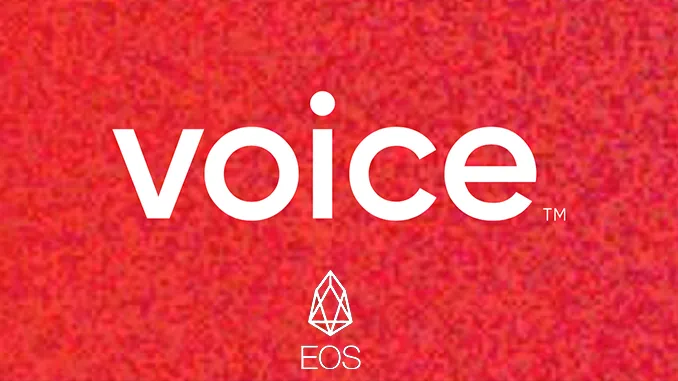
During last #hivemeetupvienna @manncpt, @schmidi and me had a discussion regarding blockchain powered social media platforms and how much of them you can find in the top 100 on CoinGecko (btw. the answer was 0 at the time).
At one point Voice was mentioned. That made me wonder about what happened to Voice. For everyone who joined Crypto in the last two years, I try to give a short summary about Voice and everything related to it:
In 2017 Dan Larimer (@dan, creator of Bitshares and Steem and thus indirectly creator of Hive) left Steemit Inc (the company behind Steem at the time) and started EOS. The timing was right, as its ICO launched right in the middle of the ICO boom and to this day the EOS ICO is the biggest ICO in history, raising $4.2 billion. EOS claimed to be an “Ethereum killer”, which was quite a popular claim back in the day, but as you probably noticed this did not really work out. For June 2019, two years after the ICO and one year after the main net launched, a big EOS event was announced, where some speculated that block.one, the company behind EOS announces a new social network. As reflected in the price, the hype was quite huge, and indeed a new social media platform was announced, Voice. The reaction to that announcement was quite lukewarm, especially the mandatory KYC requirement was seen rather negative in the crypto world. Voice promised to “fix social media”, get rid of bots, more transparency, … so quite similar to what Elon Musk promised for Twitter. Also, some crypto rewards were planned.
Fast-forward to today, just the fact that I had to write a whole paragraph, explaining what Voice is, showed that none of this worked out. Only three years after its initial announcement and two years after its launch everybody seems to have forgotten that Voice even was a thing. Sure, in Crypto two years are a small eternity, but still, that wasn’t that long ago. Last summer, so only one year after launch, Voice pivoted into a NFT platform. Pivoting to the current thing in Crypto is pretty much a confession, that the plan so far failed. Also, it seems like Voice moved split-off from block.one and is now its own entity.
Back to the original question regarding blockchain powered social media platforms: I still think we are in a very early phase and have no idea what a good social media platform for web3 looks like. Steem and Hive are obviously the OGs in this space, but also their adoption is nothing compared to the big platforms.
According to hiveblockexplorer.com, there are currently 2,393,168 registered accounts. Even though Hive is only two years old, for the sake of argument we use 2016, the launch of Steem as origin of Hive as well. Since most of the current Hive user came originally from Steem this is a valid assumption. A little over 2 million users in 6 years is not really much. For reference, Facebook reached this number in 2005, when the platform was not open for anyone and still only used by students. Facebook might be the wrong platform to compare Hive to, so let's look at Reddit. Steem and Hive are clearly inspired by Reddit, although IMHO both have a bit more focus on influencers/creators, meaning it is easier to build a brand than it is on Reddit, which makes sense since influencers were already a thing in 2016, but not in 2005 when Reddit launched. Sidenote: even though Reddit is around for quite a while, it still did not reach a point of saturation and keeps growing. Numbers are a bit harder to find for Reddit, but they reported in December 2020, that they have 52 million daily user. @penguinpablo tracks the daily accounts transacting, a comparable metric, and it is currently around 15000.
That being said, Hive is still by far the best blockchain-based social media platform there is. Steem, although technically being the original, lost a lot of its relevance and market cap since the hardfork (right now it is ranked 300 on CoinGecko, while Hive is rank 195). There are other forks of Steem like Blurt, Bearshares or Golos, but they can be considered practically dead (or in the case of Golos acually dead).
There are some social media projects on the Internet Computer, Distrikt and DSCVR a decentralised Twitter and a decentralised Reddit respectively. Both are cool but lack users.
It seems like at the moment, everybody is trying to replicate web 2.0 on the blockchain. It’s like in the early days of the internet when they put the yellow pages on the internet (do younger people actually still know what those are?): sure it works fine, and it does what you expect, but it misses so many things the technology affords. Let’s see where this journey will go for web3. I have no idea where we end up, but I will be there to enjoy the ride.